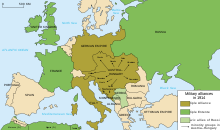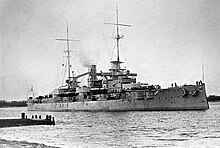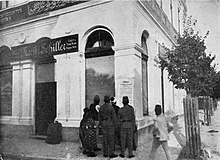
A | B | C | D | E | F | G | H | CH | I | J | K | L | M | N | O | P | Q | R | S | T | U | V | W | X | Y | Z | 0 | 1 | 2 | 3 | 4 | 5 | 6 | 7 | 8 | 9
| World War I | |||||||||
|---|---|---|---|---|---|---|---|---|---|
| |||||||||
| |||||||||
| Belligerents | |||||||||
Allied Powers:
|
Central Powers:
| ||||||||
| Commanders and leaders | |||||||||
| Main Allied leaders: | Main Central leaders: | ||||||||
| Casualties and losses | |||||||||
|
| ||||||||
World War I[j] or the First World War (28 July 1914 – 11 November 1918) was a global conflict between two coalitions: the Allies and the Central Powers. Fighting took place throughout Europe, the Middle East, Africa, the Pacific, and parts of Asia. One of the deadliest wars in history, it resulted in an estimated 9 million soldiers dead and 23 million wounded, plus up to 8 million civilian deaths from numerous causes including genocide. The movement of large numbers of troops and civilians during the war was a major factor in spreading the 1918 Spanish flu pandemic.
Increasing diplomatic tensions between the European great powers reached a breaking point on 28 June 1914, when a Bosnian Serb named Gavrilo Princip assassinated Archduke Franz Ferdinand, heir to the Austro-Hungarian throne. Austria-Hungary held Serbia responsible, and declared war on 28 July. Russia came to Serbia's defence, and by 4 August, Germany, France, and Britain were drawn into the war, with the Ottoman Empire joining in November of the same year. Germany's strategy in 1914 was to first defeat France, then transfer forces to the Russian front. However, this failed, and by the end of 1914, the Western Front consisted of a continuous line of trenches stretching from the English Channel to Switzerland. The Eastern Front was more dynamic, but neither side could gain a decisive advantage, despite costly offensives. As the war expanded to more fronts, Bulgaria, Italy, Romania, Greece and others joined in from 1915 onward.
In early 1917, the United States entered the war on the Allies' side, and later the same year, the Bolsheviks seized power in the Russian October Revolution, making peace with the Central Powers in early 1918. Germany launched an offensive in the west in March 1918, and despite initial successes, it left the German Army exhausted and demoralised. A successful Allied counter-offensive later that year caused a collapse of the German frontline. By the end of 1918, Bulgaria, the Ottoman Empire and Austria-Hungary agreed to armistices with the Allies, leaving Germany isolated. Facing revolution at home and with his army on the verge of mutiny, Kaiser Wilhelm II abdicated on 9 November.
The fighting ended with the Armistice of 11 November 1918, while the subsequent Paris Peace Conference imposed various settlements on the defeated powers, notably the Treaty of Versailles. The dissolution of the Russian, German, Austro-Hungarian, and Ottoman Empires resulted in the creation of new independent states, including Poland, Finland, Czechoslovakia, and Yugoslavia. The inability to manage post-war instability contributed to the outbreak of World War II in September 1939.
Names
The first recorded use of the term First World War was in September 1914 by German biologist and philosopher Ernst Haeckel who stated, "There is no doubt that the course and character of the feared 'European War' ... will become the first world war in the full sense of the word."[1] It was later used as a title for his 1920 memoirs by Lt-Col. Charles à Court Repington.[citation needed]
Before World War II, the events of 1914–1918 were generally known as the Great War or simply the World War.[2] In August 1914, the magazine The Independent wrote "This is the Great War. It names itself".[3] In October 1914, the Canadian magazine Maclean's similarly wrote, "Some wars name themselves. This is the Great War."[4] Contemporary Europeans also referred to it as "the war to end war" and it was also described as "the war to end all wars" due to their perception of its unparalleled scale, devastation, and loss of life.[5]
Background
Political and military alliances

For much of the 19th century, the major European powers maintained a tenuous balance of power, known as the Concert of Europe.[6] After 1848, this was challenged by Britain's withdrawal into so-called splendid isolation, the decline of the Ottoman Empire, New Imperialism, and the rise of Prussia under Otto von Bismarck. The 1866 Austro-Prussian War established Prussian hegemony in German states, while victory in the 1870–1871 Franco-Prussian War allowed Bismarck to consolidate a German Empire under Prussian leadership. Avenging the defeat of 1871, or revanchism, and recovering the provinces of Alsace-Lorraine became an obsession of French policy and public opinion for the following few years,[7] yet since the 1880s this concern was eclipsed by the conquest of a vast colonial empire, and had disappeared from the programs of all French political parties as utterly unrealistic.[8]

To isolate France and avoid a war on two fronts, Bismarck negotiated the League of the Three Emperors between Austria-Hungary, Russia and Germany. After Russian victory in the 1877–1878 Russo-Turkish War, the League was dissolved due to Austrian concerns over Russian influence in the Balkans, an area they considered to be of vital strategic interest. Germany and Austria-Hungary then formed the 1879 Dual Alliance, which became the Triple Alliance when Italy joined in 1882.[9] For Bismarck, the purpose of these agreements was to isolate France by ensuring the three Empires resolve any disputes between themselves; when this was threatened in 1880 by British and French attempts to negotiate directly with Russia, he reformed the League in 1881, which was renewed in 1883 and 1885. After the agreement lapsed in 1887, he replaced it with the Reinsurance Treaty, a secret agreement between Germany and Russia to remain neutral if either were attacked by France or Austria-Hungary.[10]
Bismarck viewed peace with Russia as the foundation of German foreign policy but after becoming Kaiser in 1890, Wilhelm II forced him to retire and was persuaded not to renew the Reinsurance Treaty by his new Chancellor, Leo von Caprivi.[11] This provided France an opportunity to counteract the Triple Alliance by signing the Franco-Russian Alliance in 1894, followed by the 1904 Entente Cordiale with Britain. The Triple Entente was completed by the 1907 Anglo-Russian Convention. While these were not formal alliances, by settling long-standing colonial disputes in Asia and Africa, the notion of British entry into any future conflict involving France or Russia became a possibility.[12] British and Russian support for France against Germany during the Agadir Crisis in 1911 reinforced their relationship, increasing Anglo-German estrangement.[13]
Arms race

German industrial strength and production had significantly increased after 1871, driven by the creation of a unified Reich, French indemnity payments, and the annexation of Alsace-Lorraine. Backed by Wilhelm II, Admiral Alfred von Tirpitz sought to use this growth in economic power to build a Kaiserliche Marine, or Imperial German Navy, which could compete with the British Royal Navy for naval supremacy.[14] His thinking was influenced by US naval strategist Alfred Thayer Mahan, who had argued that possession of a blue-water navy was vital for global power projection; Tirpitz had his books translated into German, while Wilhelm made them required reading for his advisors and senior military personnel.[15]
However, it was also an emotional decision, driven by Wilhelm's simultaneous admiration for the Royal Navy and desire to surpass it. Bismarck thought that the British would not interfere in Europe, as long as its maritime supremacy remained secure, but his dismissal in 1890 led to a change in policy and an Anglo-German naval arms race began.[16] Despite the vast sums spent by Tirpitz, the launch of HMS Dreadnought in 1906 gave the British a technological advantage over their German rivals.[14] Ultimately, the race diverted huge resources into creating a German navy large enough to antagonise Britain, but not defeat it; in 1911, Chancellor Theobald von Bethmann Hollweg acknowledged defeat, leading to the Rüstungswende or 'armaments turning point', when he switched expenditure from the navy to the army.[17]
This decision was not driven by a reduction in political tensions but by German concern over Russia's quick recovery from its defeat in the Russo-Japanese War and subsequent 1905 Russian Revolution that same year. Economic reforms, backed by French funding, led to a significant post-1908 expansion of railways and transportation infrastructure, particularly in its western border regions.[18] Since Germany and Austria-Hungary relied on faster mobilisation to compensate for their numerical inferiority compared to Russia, the threat posed by the closing of this gap was more important than competing with the Royal Navy. After Germany expanded its standing army by 170,000 troops in 1913, France extended compulsory military service from two to three years; similar measures were taken by the Balkan powers and Italy, which led to increased expenditure by the Ottomans and Austria-Hungary. Absolute figures are difficult to calculate due to differences in categorising expenditure since they often omit civilian infrastructure projects like railways which also had logistical importance and military use. It is known, however, that from 1908 to 1913, military spending by the six major European powers increased by over 50% in real terms.[19]
Conflicts in the Balkans

The years before 1914 were marked by a series of crises in the Balkans, as other powers sought to benefit from the Ottoman decline. While Pan-Slavic and Orthodox Russia considered itself the protector of Serbia and other Slav states, they preferred the strategically vital Bosporus straits to be controlled by a weak Ottoman government, rather than an ambitious Slav power like Bulgaria. Since Russia had its ambitions in northeastern Anatolia, while their clients had overlapping claims in the Balkans, balancing these divided Russian policy-makers and added to regional instability.[20]
Austrian statesmen viewed the Balkans as essential for the continued existence of their Empire and saw Serbian expansion as a direct threat. The 1908–1909 Bosnian Crisis began when Austria annexed the former Ottoman territory of Bosnia and Herzegovina, which it had occupied since 1878. Timed to coincide with the Bulgarian Declaration of Independence from the Ottoman Empire, this unilateral action was denounced by the European powers, but accepted as there was no consensus on how to resolve the situation. Some historians see this as a significant escalation, ending any chance of Austria cooperating with Russia in the Balkans, while also damaging diplomatic relations between Serbia and Italy, both of whom had their expansionist ambitions in the region.[21]
Tensions increased after the 1911–1912 Italo-Turkish War demonstrated Ottoman weakness and led to the formation of the Balkan League, an alliance of Serbia, Bulgaria, Montenegro, and Greece.[22] The League quickly overran most of the Ottomans' territory in the Balkans during the 1912–1913 First Balkan War, much to the surprise of outside observers.[23] The Serbian capture of ports on the Adriatic resulted in partial Austrian mobilisation, starting on 21 November 1912, including units along the Russian border in Galicia. In a meeting the next day, the Russian government decided not to mobilise in response, unwilling to precipitate a war for which they were not as of yet prepared to handle.[24]
The Great Powers sought to re-assert control through the 1913 Treaty of London, which had created an independent Albania while enlarging the territories of Bulgaria, Serbia, Montenegro and Greece. However, disputes between the victors sparked the 33-day Second Balkan War, when Bulgaria attacked Serbia and Greece on 16 June 1913; it was defeated, losing most of Macedonia to Serbia and Greece, and Southern Dobruja to Romania.[25] The result was that even countries which benefited from the Balkan Wars, such as Serbia and Greece, felt cheated of their "rightful gains", while for Austria it demonstrated the apparent indifference with which other powers viewed their concerns, including Germany.[26] This complex mix of resentment, nationalism and insecurity helps explain why the pre-1914 Balkans became known as the "powder keg of Europe".[27]
Prelude
Zdroj:https://en.wikipedia.org?pojem=World_War_IText je dostupný za podmienok Creative Commons Attribution/Share-Alike License 3.0 Unported; prípadne za ďalších podmienok. Podrobnejšie informácie nájdete na stránke Podmienky použitia.
Antropológia
Aplikované vedy
Bibliometria
Dejiny vedy
Encyklopédie
Filozofia vedy
Forenzné vedy
Humanitné vedy
Knižničná veda
Kryogenika
Kryptológia
Kulturológia
Literárna veda
Medzidisciplinárne oblasti
Metódy kvantitatívnej analýzy
Metavedy
Metodika
Text je dostupný za podmienok Creative
Commons Attribution/Share-Alike License 3.0 Unported; prípadne za ďalších
podmienok.
Podrobnejšie informácie nájdete na stránke Podmienky
použitia.
www.astronomia.sk | www.biologia.sk | www.botanika.sk | www.dejiny.sk | www.economy.sk | www.elektrotechnika.sk | www.estetika.sk | www.farmakologia.sk | www.filozofia.sk | Fyzika | www.futurologia.sk | www.genetika.sk | www.chemia.sk | www.lingvistika.sk | www.politologia.sk | www.psychologia.sk | www.sexuologia.sk | www.sociologia.sk | www.veda.sk I www.zoologia.sk






